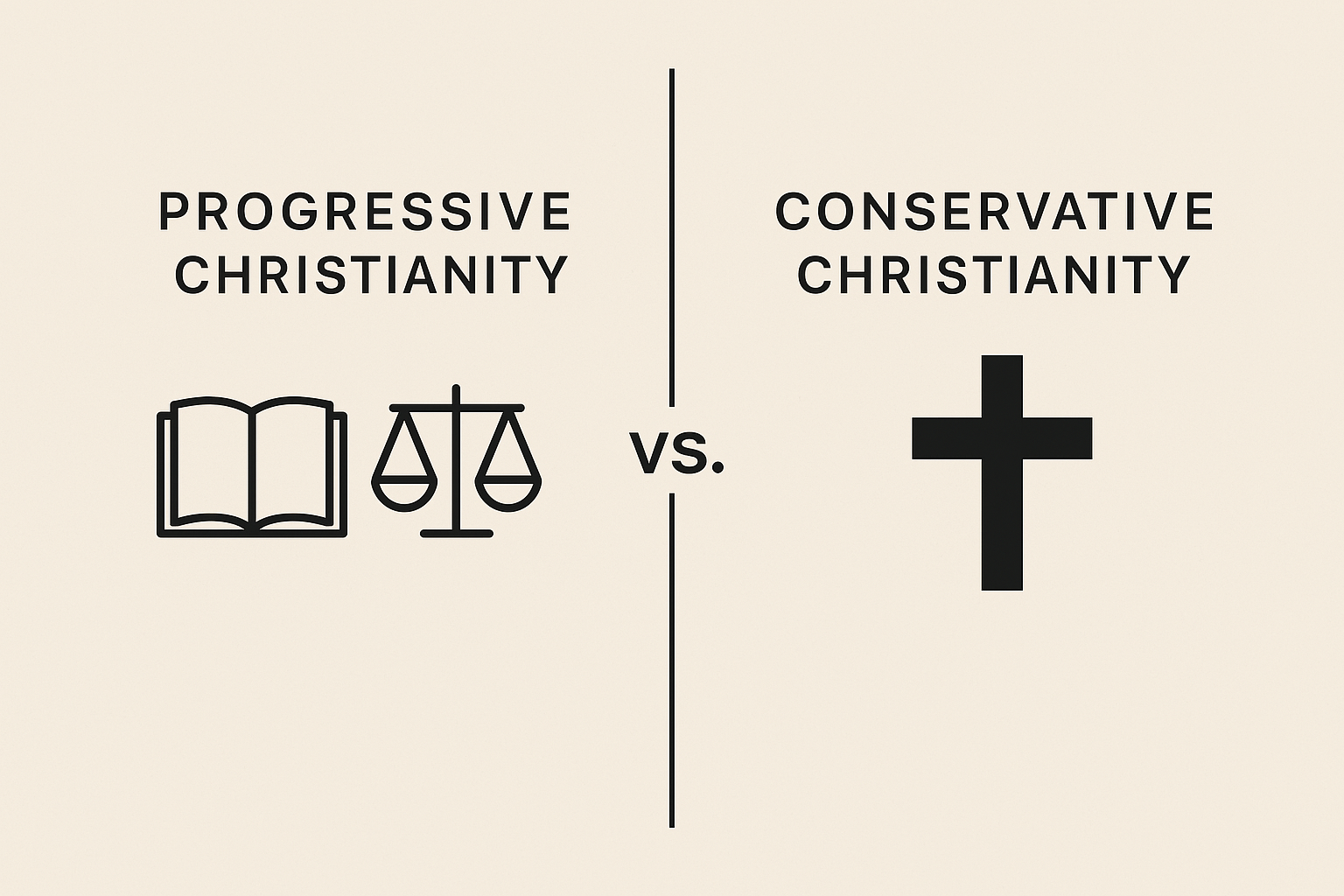By Rev. Dr. Mark David Albertson
Progressive vs. Conservative Christianity: What’s the Real Difference?
If you’ve ever tried to make sense of modern Christianity, you’ve probably noticed that not all Christians believe the same things—or even interpret the Bible the same way. Some champion social justice and inclusivity, while others emphasize biblical inerrancy and traditional values. What’s going on here?
Let’s talk about the theological differences between progressive Christianity and conservative Christianity—two major streams that shape how people today approach faith, Scripture, and society.
1. How They View the Bible: Inerrant or Inspired?
One of the biggest dividing lines comes down to how each group reads the Bible.
Conservative Christians often believe in the inerrancy of Scripture. That means they see the Bible as completely without error in its original form—true in all it teaches, whether it’s theology, history, or morality. This view places a high value on biblical authority and tends to favor a more literal interpretation.
Progressive Christians, on the other hand, usually describe the Bible as inspired—written by humans responding to God in their time and place. They see Scripture as sacred and meaningful, but not necessarily perfect or infallible. In fact, they might point out the contradictions and cultural biases in the Bible as part of an honest faith journey.
👉 Example: A conservative might say Genesis is a literal, historical account of creation. A progressive might read it as a poetic narrative about human origins and our relationship with God.
📚 Check out this progressive Christian view of Scripture from ProgressiveChristianity.org.
2. God’s Justice: Social Issues and Moral Certainty
Another big difference? Social justice.
Progressive Christianity places a strong emphasis on social justice as central to the gospel. Think racial equality, LGBTQ+ inclusion, care for the poor, climate change, and anti-violence efforts. This flows from verses like:
“He has shown you, O mortal, what is good. And what does the Lord require of you? To act justly and to love mercy and to walk humbly with your God.” — Micah 6:8 (NIV)
Conservative Christians also care about justice—but they often focus on personal morality (like sexual ethics, honesty, or family roles) and may see justice more in terms of law and order, religious freedom, or protecting the unborn.
The difference is where they draw the line on moral issues. Progressives are more likely to affirm same-sex relationships, for example, while conservatives often see that as contrary to biblical teaching.
3. Jesus: Savior, Model—or Both?
Both groups love Jesus, but how they frame his mission can differ.
Conservative Christianity emphasizes Jesus as the savior who died for our sins so we can go to heaven. The core message is about personal salvation through faith in Christ (see John 3:16).
Progressive Christians still affirm Jesus’ saving work—but they also highlight Jesus as a model for living. His teachings about loving enemies, caring for the marginalized, and challenging systems of oppression are central. For them, following Jesus means more than just believing—it’s about living out the kingdom of God on earth.
“The Spirit of the Lord is on me, because he has anointed me to proclaim good news to the poor…” — Luke 4:18
🌍 Want to see how progressive Christians frame Jesus’ mission? Check out Reclaiming Jesus.
4. Faith and Doubt: Certainty vs. Exploration
For many conservative Christians, certainty is a virtue. Faith means trusting God’s Word as truth and resisting cultural changes that contradict biblical teachings.
Progressive Christians tend to be more comfortable with questions, doubt, and mystery. They might say, “It’s okay not to have all the answers.” They’re often drawn to the idea that faith is a journey rather than a set of fixed beliefs.
This approach can be especially welcoming to people who’ve experienced spiritual trauma or left rigid religious environments. It’s also appealing to folks who feel that traditional faith doesn’t fully address modern questions about science, identity, or suffering.
As Rachel Held Evans once wrote:
“Doubt is a part of faith. People who insist that it isn’t have never really lived it.”
So… Which One Is “Right”?
Here’s the thing: Both progressive and conservative Christians are trying to be faithful. They just define faithfulness differently.
- Conservatives want to stay rooted in timeless truth.
- Progressives want to apply timeless love to today’s world.
If you’re exploring Christianity and wondering where you fit, don’t feel pressured to choose sides right away. There’s a wide spectrum between the two, and many Christians borrow from both perspectives.
What matters most is this: Are you growing in love for God and others? Are you seeking truth, justice, and grace?
Because that’s the heart of the gospel—no matter how you interpret the rest.
Want to Learn More?
Here are a few helpful resources to go deeper:
- 📖 8 Points of Progressive Christianity
- 📰 The Gospel Coalition (for a conservative perspective)
- ✍️ Rachel Held Evans’ blog archive

